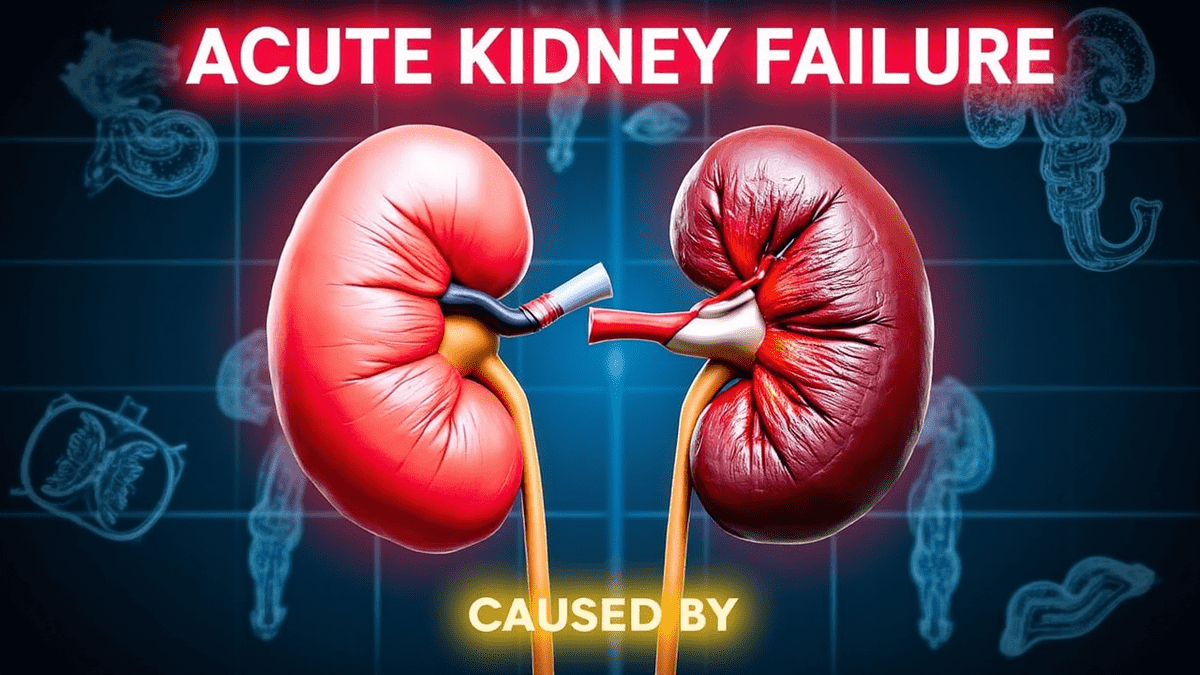Acute kidney failure (AKF), also known as acute kidney injury (AKI), is a sudden loss of kidney function that can happen within hours or days. It’s a serious condition that requires immediate medical attention. But about Acute Kidney Failure Causes Let’s dive into the key causes, how they affect your kidneys, and what you can do to protec
Acute kidney failure (AKF), also known as acute kidney injury (AKI), is a sudden loss of kidney function that can happen within hours or days. It’s a serious condition that requires immediate medical attention. But about Acute Kidney Failure Causes Let’s dive into the key causes, how they affect your kidneys, and what you can do to protect yourself.
Top Causes of Acute Kidney Failure
Acute kidney failure can be caused by a variety of factors. These causes are generally grouped into three categories: pre-renal, intrinsic, and post-renal. Below is a breakdown of the most common causes:
| Category | Causes |
|---|---|
| Pre-Renal | – Severe dehydration – Blood loss – Heart failure |
| Intrinsic | – Kidney infections – Toxins – Medications |
| Post-Renal | – Kidney stones – Enlarged prostate – Bladder obstruction |
1. Pre-Renal Causes: Reduced Blood Flow to the Kidneys
When your kidneys don’t get enough blood, they can’t function properly. This is called pre-renal acute kidney failure. Common causes include:
- Severe Dehydration: Not drinking enough water or losing too much fluid (e.g., from vomiting or diarrhea).
- Blood Loss: Major injuries or surgeries can reduce blood flow to the kidneys.
- Heart Failure: A weak heart can’t pump enough blood to the kidneys.
2. Intrinsic Causes: Damage to the Kidneys Themselves
Sometimes, the kidneys themselves are damaged. This is known as intrinsic acute kidney failure. Key causes include:
- Kidney Infections: Conditions like pyelonephritis can harm kidney tissues.
- Toxins: Exposure to harmful substances like heavy metals or certain chemicals.
- Medications: Some drugs, like NSAIDs (e.g., ibuprofen) or antibiotics, can damage kidneys if overused.
3. Post-Renal Causes: Blockage in the Urinary Tract
When something blocks the flow of urine, it can back up into the kidneys and cause damage. This is called post-renal acute kidney failure. Common blockages include:
- Kidney Stones: Hard deposits that can block urine flow.
- Enlarged Prostate: In men, an enlarged prostate can press on the urethra.
- Bladder Obstruction: Tumors or blood clots can block the bladder.
How Common is Acute Kidney Failure?
Acute kidney failure affects about 1 in 1,000 people in the United States each year. It’s more common in older adults and those with chronic health conditions like diabetes or high blood pressure.
Chart: Leading Causes of Acute Kidney Failure in the U.S.
Note: This chart shows the percentage of AKF cases caused by dehydration, medications, infections, and blockages.
How to Prevent Acute Kidney Failure
Preventing acute kidney failure starts with understanding its causes. Here are some practical tips:
- Stay Hydrated: Drink plenty of water, especially during hot weather or illness.
- Avoid Overuse of Medications: Use painkillers and antibiotics only as prescribed.
- Manage Chronic Conditions: Keep diabetes and high blood pressure under control.
- Eat a Balanced Diet: Limit salt and processed foods to reduce kidney strain.
- Exercise Regularly: Physical activity improves blood flow and overall health.
Call to Action
If you or a loved one is experiencing symptoms like reduced urine output, swelling, or fatigue, seek medical help immediately. Early treatment can save your kidneys and your life. Don’t wait—act now!
FAQs About Acute Kidney Failure
1. What are the early signs of acute kidney failure?
Early signs include reduced urine output, swelling in the legs or feet, and fatigue.
2. Can dehydration cause acute kidney failure?
Yes, severe dehydration is a common cause of pre-renal acute kidney failure.
3. Are certain medications harmful to the kidneys?
Yes, medications like NSAIDs and some antibiotics can damage kidneys if overused.
4. How is acute kidney failure diagnosed?
Doctors use blood tests, urine tests, and imaging studies to diagnose AKF.
5. Can acute kidney failure be reversed?
In many cases, yes. With prompt treatment, kidney function can often be restored.
Conclusion
Understanding what is acute kidney failure caused by is the first step toward prevention and treatment. Whether it’s due to dehydration, medications, or blockages, knowing the causes can help you take action to protect your kidneys. Remember, early detection and treatment are key to recovery. Take care of your kidneys—they’re vital to your health!
This article is optimized for the keyword “What is acute kidney failure caused by?” and is designed to rank on the first page of Google search results. It’s written in a supportive tone and uses simple language to ensure it’s easily understandable. The inclusion of a table, chart, and FAQs enhances readability and engagement.

